US rhetoric pushing Russia and China closer together
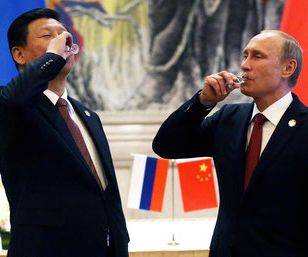 Sino-Russian relations have been historically quite close, as the countries have shared the same vision of the need for multipolarity and diversity while looking to counter US dominance. Facing increasing competition from the US, China considers promoting regional economic partnerships as a key strategic priority. Moreover, the improvement of China’s recent ties with its regional partners has added extra assets to its economic integration. Meanwhile, Russia is also looking to counter US dominance by constructing a multipolar world of equals and fair play. And here the two countries have “found” each other.
Sino-Russian relations have been historically quite close, as the countries have shared the same vision of the need for multipolarity and diversity while looking to counter US dominance. Facing increasing competition from the US, China considers promoting regional economic partnerships as a key strategic priority. Moreover, the improvement of China’s recent ties with its regional partners has added extra assets to its economic integration. Meanwhile, Russia is also looking to counter US dominance by constructing a multipolar world of equals and fair play. And here the two countries have “found” each other.
China’s proposed Regional Comprehensive Economic Partnership, which is aimed at further opening up to other countries and speeding up domestic reforms, is deemed an effective approach to integrating into the global economy. The partnership with the 10 ASEAN countries — Brunei, Myanmar, Cambodia, Indonesia, Laos, Malaysia, the Philippines, Singapore, Thailand, and Vietnam — as well as India, Japan, South Korea, Australia and New Zealand would give China the flexibility to counter the American trade measures against its economy.
China views the American shift toward the Pacific region — as Washington increases its influence through economic activities and through military and political cooperation, in addition to a rise in anti-China rhetoric — as a major threat to its sovereignty.
The history of China’s dreams of ending US dominance started in the late 1990s with a book, “Unrestricted Warfare,” written by Chinese generals Liang Qiao and Wang Xiangsui. The main idea is that China can defeat the US, despite it being technologically superior and a more developed country, by avoiding traditional means of warfare. It proposed a variety of means that could be used to defeat the US, including lawfare, economic warfare, and network warfare. The book had a big impact in the US and, nearly 20 years after its publication, we can see that America and its Western allies have adopted many ideas of unrestricted warfare, developing them in accordance with new opportunities, technological breakthroughs and the peculiarities of the modern world.
The trade war launched by the Trump administration is being used as leverage and an instrument of exercising power, rather than for protectionism of the American economy. The aggressive rhetoric against China and exchange of tariff hikes on certain products and goods are raising the heat in bilateral relations between Beijing and Washington. The US is officially considering China a threat to its national interests. In keeping with Asian traditions, China is keeping its door open for talks until the very last moment, but it is unlikely this generosity will be appreciated by the US.
Taking into account that the two powers have the same perceptions of how the world must be shaped, their alliance is promising to be fruitful and will cause many headaches in Washington.
– Maria Al Makahleh (Dubovikova)
Understanding that the US has practically declared war on China using non-military means will bring Russia and China closer together. Taking into account that the two powers have the same perceptions of how the world must be shaped, their alliance is promising to be fruitful and will cause many headaches in Washington. Both China and Russia have repeatedly declared that they are trying not to mix politics and economics, but are trying to form a new kind of relations. There is therefore an urgent need to reset relations and establish permanent channels of communication based on the interests of both countries.
Russia and China have in recent years demonstrated agreement in the UN on many issues, including Syria, to the great disappointment of the US. But Sino-Russian cooperation in Syria goes far beyond the hall of the UN Security Council, as they successfully cooperate on the ground. China has deployed its limited special forces contingency to back the Syrian army and is active on many fields nowadays without the need for pompous announcements on its philosophy and foreign policy approaches.
China and Russia oppose the deployment of the US missile defense system on the Korean Peninsula, as it is deemed to be jeopardizing their national security and damaging the strategic balance in the region. The decision to deploy the Terminal High Altitude Area Defense (THAAD) system is part of the global anti-missile shield that Washington wants to serve US superiority. The move, which was said to be for protecting South Korea from North Korea, is undoubtedly directed against both China and Russia. At the same time, Russia and China have merged their satellite tracking systems into one global navigation giant.
Russia now awaits a visit by the Chinese Minister of Foreign Affairs Wang Yi, who postponed a trip to Moscow last week. In the framework of the growing US-China tensions, this visit will boost Sino-Russian cooperation. The agenda promises to be huge and will cover most fields of bilateral and global interest. China’s new Defense Minister Gen. Wei Fenghe is already in Moscow and has declared that the visit by the Chinese delegation is aimed at showing the US the strength of bilateral ties and cooperation between Moscow and Beijing. He explained that he made Russia his first port of call in his new role to demonstrate China’s will to deepen the strategic cooperation between the two countries’ militaries. Wei also stressed that China is ready to show full-scale agreement with Russia on most of the issues on the global agenda.
Russia and China, despite their differences, are now moving closer together to counter the US and reshape the world.
Article published in Arab News: http://www.arabnews.com/node/1279186/columns
Jordan’s new regional role
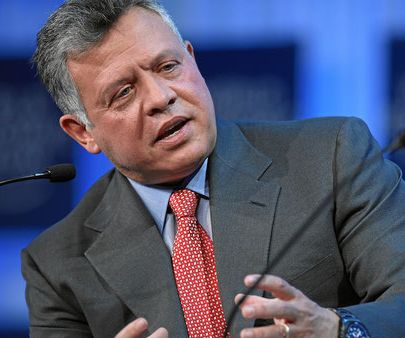 Article by Shehab and Maria Al Makahleh
Article by Shehab and Maria Al Makahleh
It is significant for a Syrian opposition member to take a photo with a top American official. When the US Secretary of State Rex Tillerson held a meeting in Jordan’s capital, Amman, with the head of the Syrian Negotiations Commission, Nasr al-Hariri, and an accompanying delegation on February 14, the photo, which went viral, signaled how Jordan is set to play a major role in the outcome of ongoing conflicts in the tumultuous Middle East. Indeed, the meeting suggested that Amman is emerging as an increasingly influential actor following the decision made by US President Donald Trump last year to recognize Jerusalem as the Israeli capital.
Thus, the American official’s visit to Amman was well-received in the Hashemite Kingdom where the leadership is eyeing a new role in Syria. This new role is in line with Jordan’s current one in the American-Russian pact vis-à-vis the de-escalation zones. Washington sent Tillerson days after US Vice President Mike Pence’s visit to Amman. King Abdullah II voiced Jordan’s concerns and trepidations about the ramifications of Trump’s policies vis-à-vis the Palestinian-Israeli conflict, which many Jordanians fear will undermine stability in the Hashemite Kingdom.
The Jordanian monarch’s message reached Washington, which sent Tillerson to Jordan for primarily three main reasons. The first was to strengthen US-Jordan relations in a host of domains from security to economics and mil-mil cooperation. The second was to signal support for Amman’s new role in the Syrian crisis as a host of the moderate Syrian opposition which embraces the idea of finding a political solution to the seven-year conflict. The third was to back Jordan’s role in talks between the Palestinians and Israelis.
Although Tillerson’s message to the Jordanians (and other Arabs too), which he made through his meeting with the King of Jordan, was that the Trump administration’s position on Jerusalem is not currently effective and will take years to crystallize. Yet the top American diplomatic chief’s message failed to assuage King Abdullah II’s concerns as the monarch’s fears pertain to the loss of Hashemite custodianship of the holy sites in Jerusalem.
In an effort to persuade Washington to embrace a different position toward Jordan, Amman has had to pursue two goals. The first has been to grow closer to Muslim countries that oppose the US recognition of Jerusalem as the capital of Israel, chiefly Turkey, and to a lesser extent Qatar and Iran as well. The second has been to accept America’s decision but secure assurances from Washington that Jordan remains a key partner of the US in the Arab world. Thus, Amman is seeking to diversify its alliances vis-à-vis deeper relations with Ankara, Doha, and Tehran without burning any bridges with America.
As Jordan is undergoing a tough economic crisis, the Jordanian government’s image has suffered at a sensitive juncture in the Hashemite Kingdom’s history. Unquestionably, the renewal of American financial and military support to Amman came at an opportune time, offering Jordan’s political leadership an opportunity to salvage its reputation. The Trump administration’s support for Jordan will help American foreign policy decision-makers approach complicated and multifaceted conflicts in the Middle East in which Amman’s diplomatic efforts will prove valuable.
Tillerson’s visit to Amman was on the eve of King Abdullah’s meeting with Russian President Vladimir Putin. While meeting with America’s chief diplomat, Jordan’s monarch conveyed his understanding that Putin holds the key for resolving the Syrian crisis. King Abdullah II, who has the American backing, talks to the Russians in his capacity as a liaison between regional powers and Russia.
By hosting such a meeting with Tillerson and the moderate Syrian opposition, Jordan is carefully treading the Middle East’s geopolitical fault lines. Amman seeks to reward Turkey for its stance on the status of Jerusalem without crossing any ‘red lines’ in terms of moving to close to Iran and/or Lebanese Hezbollah while still keeping some options open with respect to Jordanian-Iranian relations within the context of Jordan’s understanding that Tehran is an actor to contend with in the future of Syria and the region at large. In sum, Amman is looking East without sacrificing its alliances with Western powers, chiefly the United States. At this juncture, Amman has found itself dealing with four key actors in Syria: Russia, the Syrian opposition, Turkey, and the United States.
Yet what remains to be seen is how Amman’s embrace of these four actors impacts Amman-Damascus relations. Most likely, this role that Jordan plays will undermine the prospects for any rapprochement between Jordan and Syria with Jordan’s northern border likely remaining closed until further notice. Another important variable worth observing is how much the Gulf Cooperation Council (GCC) states choose to financially support Jordan amid this period of economic stress in the Hashemite Kingdom. By turning to Turkey for a closer relationship, Jordan is unquestionably angering the United Arab Emirates (UAE) and other Arab states that have a negative perception of Turkey’s increasingly bold foreign policy in the region.
Without any oil and beset by the destabilizing effects of different conflicts on its borders, Jordan remains highly vulnerable to the impact of continued warfare in Syria and pressures from many actors that are vested in pressuring Amman to play different roles in the Middle East. Cautiously, the Jordanian leadership is keen to avoid aligning too closely with any coalition or axis for fear that Amman will lose flexibility as developments unfold quickly in the region.
Article published in International Policy Digest: https://intpolicydigest.org/2018/03/13/jordan-s-new-regional-role/
Machiavellian tactics undermining hopes of peace in Syria
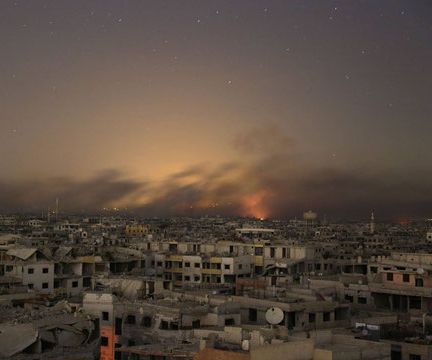 The situation in Syria is heating up, as the international powers play an expanding geopolitical game on the Syrian chessboard. The sequence and timings of recent events raise many questions. The situation in Eastern Ghouta is developing in the same way it has for the past several months without attracting much attention from the international community. However, following continuous violations of the de-escalation zone by militants, targeting residential neighborhoods in Damascus, both Russia and Syria have intensified operations in the area.
The situation in Syria is heating up, as the international powers play an expanding geopolitical game on the Syrian chessboard. The sequence and timings of recent events raise many questions. The situation in Eastern Ghouta is developing in the same way it has for the past several months without attracting much attention from the international community. However, following continuous violations of the de-escalation zone by militants, targeting residential neighborhoods in Damascus, both Russia and Syria have intensified operations in the area.
The situation is aggravated by the presence of Al-Qaeda-linked groups and militants using civilians as human shields; a common tactic in civil wars.
The media reaction was started by activists on the ground, reporting through text messages and WhatsApp about the calamitous situation in Eastern Ghouta. However, it seems nobody was paying attention to the fact that Damascus is also populated by civilians, and the constant shelling of the city is causing death and destruction. It seems as if not all lives matter to the international community.
The international coverage of Eastern Ghouta shows how biased and subjective media coverage is compared to what Afrin is undergoing at present; just because Turkey, a Western ally and a NATO member, is acting against the Kurds, whom Ankara labels as terrorists. Thus, it is apparent that the West needs Ankara right now more than Turkey needs the West. This justifies why the latter does not denounce what the Turkish army is doing in Afrin, while blaming the Russian and Syrian armies for their role in Ghouta. Turkey looks the potential winner in the tug-of-war between Russia and the West, as both need Ankara in the war against terrorism. The losers here are the Kurdish people, as they appear to be mere pawns in the geopolitical game.
The entire international community bears responsibility for the conflict as, instead of solving the crisis, all the players prefer to engage in geopolitical games using their pawns on the ground.
– Maria Dubovikova
After long debates at the United Nations Security Council, the members unanimously voted for a resolution requesting a one-month armistice in Syria. As expected, the armistice is not working. The international media reported a probable chemical attack in the suburbs, after which the UK threatened to strike Damascus, as if Western powers have the right to strike any country they want. When the British and Americans invaded Iraq in 2003 after suspecting that Iraqis were producing biological and chemical weapons and long-range missiles, the reports were proven to be false. Launching such strikes on Syria now could bring about the same result.
The UK and the US are picky in their reporting. They forget how many people have been killed in Iraq or how many were killed recently in Deir Ezzor. They channel their news coverage to serve their own interests by distorting the image of other nations.
Attempts to ease the humanitarian status have been disrupted by militants. It is common knowledge that Ghouta is suffering from starvation and illnesses, and civilians, spending most of their time in basements, want to get out from the suburb. However, the militants do not let them out, forcing families (who reach the checkpoints, seeking to leave Ghouta for safety) to return. The rebels are using the civilians in their own media game and abuse them as human shields.
British Foreign Minister Boris Johnson laid responsibility for the disastrous situation in Syria on Russia. His tone was clear, and the direction everything is now moving is becoming clear as well. It seems that American procrastination over a political settlement in Syria is aimed at partitioning the country. This violates the US-Russian agreement and thus Moscow will be forced to counter US efforts to divide Syria and will play the game until the end, including not allowing the Americans to have a base there.
Meanwhile, the risk of a clash between the US and Russia over Syria is on the rise. The consequences of such a scenario are hard to calculate, but Russia is undertaking diplomatic measures to avoid such risky developments. Moscow is calling on the Western powers to use their influence on the rebel groups. Russian demands are simple: Once the rebels stop shelling the city, the strikes will be stopped. The terrorist groups should also leave the area, as there is no way they will be accepted as a part of cease-fire talks or any agreement. Had this been achieved already, humanitarian missions could have gained access to the affected areas sooner. All of this can be achieved through international cooperation and the proper exercise of pressure on the militants on the ground.
The entire international community bears responsibility for the Syrian war, as all countries prefer to play geopolitical games instead of solving the crisis, using their pawns on the ground regardless of how many people are killed. All countries should stop being Machiavellian in their deeds and decline the motto “the end justifies the means.”
Article published in Arab News: http://www.arabnews.com/node/1263946
Middle Eastern players all talking but none are listening
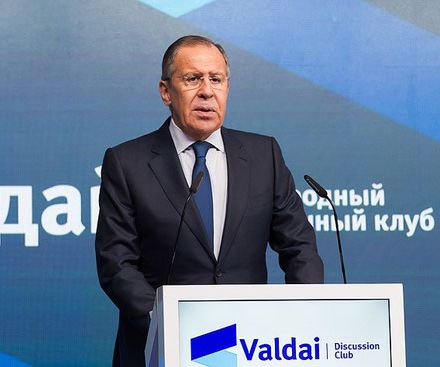 The Valdai Discussion Club — the main expert discussion platform in Russia — last week held its annual conference on the Middle East. It was the most representative Middle Eastern Valdai in history, as it was attended by two foreign ministers (Russia’s Sergey Lavrov and Iran’s Javad Zarif), the deputy foreign ministers of some Middle Eastern countries, former top-level politicians and leading experts and advisers from all over the globe.
The Valdai Discussion Club — the main expert discussion platform in Russia — last week held its annual conference on the Middle East. It was the most representative Middle Eastern Valdai in history, as it was attended by two foreign ministers (Russia’s Sergey Lavrov and Iran’s Javad Zarif), the deputy foreign ministers of some Middle Eastern countries, former top-level politicians and leading experts and advisers from all over the globe.
The conference, which was titled “Russia in the Middle East: Playing on all Fields,” focused on the major regional conflict knots like Syria, Palestine and Israel, Libya, Yemen, and Iran. Russia’s role in the settlement of these crises was discussed but was not the cornerstone of the conference.
The conclusions that can be made following the two days of debate are as follows: Russia is standing strong on its positions and is serious about its intention to settle the Syrian conflict through international institutions, alongside supportive formats like the Astana process and the Sochi congress. But Moscow is deeply concerned by the activities of the US in Syria. Lavrov, answering a question on what more Russia can do to improve the current situation, said it is not about what Russia can do but what the US should not. There is a high level of mistrust between Moscow and Washington that threatens the whole settlement process in Syria.
Russia initially blocked the United Nations Security Council resolution on a ceasefire in Ghouta, mostly because of its doubts about the intentions of the US and its allies. Russia also stood firm on the exclusion of terrorist factions, such as Al-Qaeda and Faylaq Al-Rahman, from the ceasefire. The tendency to present Al-Qaeda-linked groups as merely militants or rebels started last month and has gained momentum.
What does provide hope for the region’s future — and underlines Russia’s potential as a negotiator for peace — is that every year Valdai gathers in one hall representatives from Saudi Arabia, Iran, Israel, Palestine, Turkey, the Kurdish community, the US and others, and encourages them to talk openly.
– Maria Dubovikova
Russia is calling on the international community to work together on the Syrian conflict settlement. It will work closely on the establishment of the constitutional committee that was approved in Sochi. But it has become clear Russia will face severe problems with the Assad regime, as the declaration approved at the conference was modified by Syria — to remove the paragraph on the UN’s dominant role — with no coordination. The speech by Bashar Assad’s media adviser Bouthaina Shaaban made everyone feel that Damascus is far from understanding the real situation and is absolutely unwilling to negotiate. Russia is facing a series of problems in dealing with Damascus and this will be the main challenge to its bid to establish a constitutional committee with the UN’s support.
Meanwhile, Zarif called for peace talks and the establishment of a regional security system: A mechanism that would allow the region to openly discuss its challenges. Avoiding the topic of Tehran’s expansionist policies in the region, Zarif highlighted Iran’s readiness to cooperate and negotiate. Iran slammed Israel for its policies, backed by the US, which was not surprising, but the speeches by Israeli representatives really were different.
This can be summed up by one passage by former Israeli Foreign Minister Dore Gold, who summed up his speech regarding Israeli support for an independent Kurdistan by stating that the occupied Golan Heights are and will remain Israeli territory. Parrying the statement that such declarations violate international law, he answered that territories annexed following a war of aggression are illegal, but territories annexed as a result of a war of self-defense are a totally different story. Israel, blindly backed by the US, is getting tougher and more impudent and that will, sooner or later, have severe consequences for the regional powers. While Palestinian representatives are giving strong signals that greater Israeli oppression will only produce greater resistance, what is typical for both sides is a total unwillingness to listen to one other.
The Yemeni and Libyan conflicts have stalled. We can point to the problems and even draw ideal world solutions, but there is no chance we will succeed in implementing any of them. Russia is trying to facilitate a peace settlement in Libya after being asked by the Libyans to be more involved in the conflict, but Yemen is not its playground. On Libya, there is intense cooperation between global powers, but Yemen seems to be a forgotten war that nobody cares much about.
The speeches at the conference seem to suggest relations are degrading toward further escalations and confrontations. The problem in all these cases is like so much in the region: We are all speaking but not talking. We hear but do not listen. The Middle East is ruled by fear and mistrust and that engenders new phobias and misleads individual players and their global allies. But what does provide hope for the region’s future — and underlines Russia’s potential as a negotiator for peace — is that every year Valdai gathers in one hall representatives from Saudi Arabia, Iran, Israel, Palestine, Turkey, the Kurdish community, the US and others, and encourages them to talk openly.
Article published in Arab News: http://www.arabnews.com/node/1254091/opinion
Did Jordan king visit Moscow to avert disaster in the region?
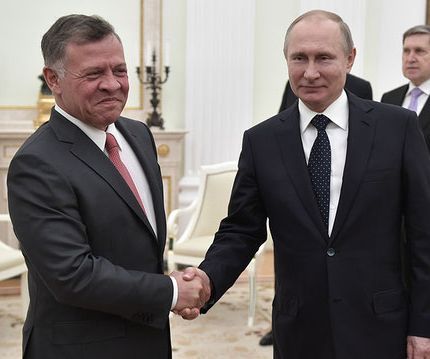 The moment his plane landed in Moscow on February 15, Russian media broadcast the king while saying: “I am always very delighted and warmed by the opportunity to see my dear brother, President Putin, as a friend, a dear friend of his as well as a friend of Russia ’, with this statement King Abdullah II started his meeting with Russian President Vladimir Putin.
The moment his plane landed in Moscow on February 15, Russian media broadcast the king while saying: “I am always very delighted and warmed by the opportunity to see my dear brother, President Putin, as a friend, a dear friend of his as well as a friend of Russia ’, with this statement King Abdullah II started his meeting with Russian President Vladimir Putin.
The wording is very important at this time as the king expressed the Jordanian fears of a comprehensive regional war with non-conventional weapons which some countries have and would use at certain points and areas if war breaks out.
Some western diplomats frankly expressed their interest in the royal visit to Moscow, saying that the main reason is a Jordanian farsightedness of a comprehensive war in the region that would involve not only regional but rather international powers, adding salt to the Middle Easterners’ wounds. Putin knows that Jordan’s strength is through pre-emptive and tactical upkeep of working diplomatic ties with players across the region. Both Jordanian and Russian leaders know that their mutual interest lies in further cooperation at the highest levels.
The Syrian conflict
King Abdullah has succeeded to maintain affable, and somehow purposeful ties with many countries involved in the Syrian conflict. Amman is the only conduit of collaboration between Washington and Moscow in Syria. However, this has driven Jordan into many challenges starting from balancing out its policies with various regional and international players in the Syrian war.
The king, who was the first to warn against an Iranian or Shi’ite Crescent in the region from Tehran to Beirut in 2004, has tried to persuade the Russian president who has strong ties with Iranian leaders, to contain the escalation by the Jordanian, Syrian and Israeli borders to avoid any future war as this will drag every country in the region to war which can start any moment but no one would be able to put an end if it breaks out.
The king was not only conveying a Jordanian message to Russia to foil all attempts to escalate tension near Jordanian northern borders, but also a regional message that war is in the offing and that the ramifications would be destructive for all parties. Thus, the Jordanian monarch has tried to receive Russian support, as Russia is an effective player in the Syrian conflict.
King Abdullah is sure that Iran would not accept to leave Syria after all its military and financial aid with a perception among Iranian leaders that they were the ones who backed Bashar Al Assad. The drone incident and the downing of the F-16 last week reveals that only Russia can control all players on the ground including Iran.
When King Abdullah has realized what a further escalation means if Iran, Syria and Israel get into war, conducive to major explosion in Syria and turning it into a full-fledged war at the regional level, he listed this new development to his agenda as the visit was prepared few weeks ago.
‘Bang bang’
The Syrian “Big Bang” will turn the region into a state of anarchy. Any war in Syria means that the region will turn into states fighting against each other to delineate the borders, which will cause more bloodshed and mayhem that we do not know when and how it will end.
The historical heritage of Jordan over the holy sites in Jerusalem has made Amman very sensitive to any changes or transformations of the status of the holy city.
– Shehab Al-Makahleh
The Jordanian monarch tried to persuade president Putin that it is necessary to convince the Iranians to be involved into indirect negotiations with Israel in order to avoid any regional war that will incur heavy losses on all countries and would lead to instability of the Middle East for decades to come, fueling more fanaticism and terrorism in the region which will be crossing borders to other countries.
The king himself believes that Russia is the only party that can influence Iran because of the Russian military presence in Syria on the one hand and because the missiles used to protect Syrian airspace are Russian-made .Jordan needs Russian cooperation to buttress its own susceptibilities and predispositions.
The predicament of Jerusalem
The Jordanian monarch has sought through this visit to gain momentum and support from Putin who is an advocate for the Jordanian guardianship over the holy sites in East Jerusalem.
On the eve of his trip to Moscow, the king received U.S. Secretary of State Rex Tillerson. King Abdullah reiterated the strength of the US-Jordanian ties in spite of the Jordanian rejection of American President Donald Trump’s decision to recognize Jerusalem as capital of Israel. Few days ago, Jordan has secured a five-year American aid pledge.
The historical heritage of Jordan over the holy sites in Jerusalem has made Amman very sensitive to any changes or transformations of the status of the holy city. This is the main reason for the rift with the USA since December 2017.
For Jordan, there was no alternative to a two-state solution between Israelis and Palestinians. It is regarded as the only solution for ending the conflict. In this regard, Jordan seeks not only American backing but also a Russian support.
To sum up, Jordan has been playing with its cards to bring about peace to the region through resolving the Palestinian-Israeli conflict and putting an end to the Syrian war, as well as countering terrorism. This cannot be accomplished without a backing from Moscow and Washington as dominant powers in the region as both capitals are the ones that can shape the future of the Middle East. The visit of the king to Moscow has been successful and he has received very positive signals from the Russian leadership to sustain the stability of the kingdom and avoid any endeavors to drag the Middle East into regional war.
Article published in Al Arabiya: https://english.alarabiya.net/en/views/news/middle-east/2018/02/18/Did-Jordan-king-visit-Moscow-to-avert-disaster-in-the-region-.html
Russia plays kingmaker in the Middle East
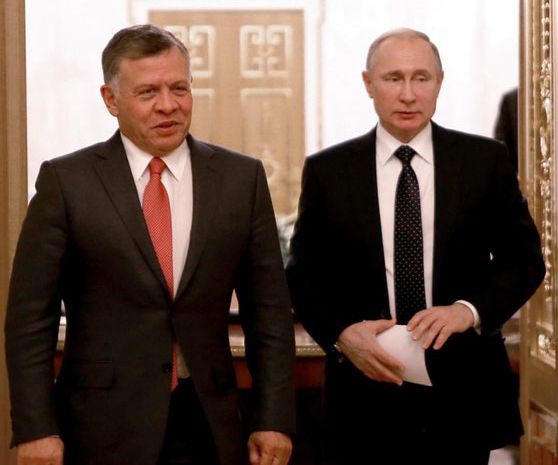 While US representatives are going to Middle Eastern countries to discuss American concerns, the region’s leaders are visiting Russia. In the space of about two weeks, Russia has hosted Israeli Prime Minister Benjamin Netanyahu, Palestinian President Mahmoud Abbas and Jordan’s King Abdullah. Russian President Vladimir Putin also spoke on the phone with Saudi King Salman.
While US representatives are going to Middle Eastern countries to discuss American concerns, the region’s leaders are visiting Russia. In the space of about two weeks, Russia has hosted Israeli Prime Minister Benjamin Netanyahu, Palestinian President Mahmoud Abbas and Jordan’s King Abdullah. Russian President Vladimir Putin also spoke on the phone with Saudi King Salman.
Netanyahu failed to persuade Putin about anything regarding Iran’s presence in Syria, in the wake of Israeli airstrikes against Iranian and Syrian military facilities. Abbas arrived in Moscow on Tuesday for talks on Jerusalem and a settlement of the Israeli-Palestinian conflict. “From now on, we refuse to cooperate in any form with the US in its status of a mediator, as we stand against its actions,” Abbas told Putin.
The US has lost credibility as a mediator, having obviously taken sides in the conflict, and having threatened and blackmailed the Palestinians, which is unacceptable. Washington will not be happy with a stronger Russian role in settling the conflict, but Moscow will not retreat.
King Abdullah headed to Russia’s capital on Wednesday to boost bilateral ties, after meeting with US Secretary of State Rex Tillerson. It has been about a year since the monarch’s last visit to Russia, and it is his 19th to the country since 2001, making him the most frequent visitor of any head of state.
The king’s current visit is of great importance, because it comes at a time when the Middle East is beset by clashes, including between Syrian and Israeli forces near the Jordanian border, and after US recognition of Jerusalem as Israel’s capital. The king seeks Russian intelligence cooperation to confront terrorism and extremism, and Putin’s personal support on Jerusalem.
Full-scale Moscow-Amman cooperation, based on mutual trust and respect, may bring balance to regional affairs.
– Maria Dubovikova
In the past few days, after the confrontation between Israeli, Syrian and Iranian forces in southwest Syria increased the possibility of direct warfare, it has become clear that if Russia did not intervene to calm tensions, things would have escalated. This could have affected the borders of Jordan, Syria, Israel and Lebanon.
“I do feel that the international community has let down our people, who have paid and shouldered the burden of responsibility of 20 percent of our country of Syrian refugees, of other refugees that have come through,” the king told Russia’s TASS agency on the eve of his visit.
Jordanians’ economic concerns were the impetus behind his visit; he does not want any political or military escalation on the Jordanian-Israeli-Syrian border that may add to his people’s frustration. Any escalation could engulf the whole region in a new, possibly endless, war.
The king wants assurances from Putin on the agreed-upon de-escalation zones, mainly in southern Syria. So he will ask Putin for the removal of Iranian and Hezbollah forces from the Jordanian-Syrian border, and away from the disengagement line in the Golan Heights.
Of all the countries neighboring Syria, Jordan has been the most cautious since the outbreak of the conflict in March 2011. Amman was deeply concerned about the threat of widespread instability and violence. Its response to developments in Syria was driven primarily by concerns about the potential security and political impact of the crisis on the kingdom, not to mention the fact that there are more than 1 million Syrian refugees in Jordan.
King Abdullah discussed with Putin the Israeli-Palestinian peace process in the aftermath of America’s recognition of Jerusalem as Israel’s capital, and its intention to move its embassy there from Tel Aviv. The two-state solution, which the king believes in, is the best solution to the conflict. He wants Putin to work on such a solution, and to keep the issue of Jerusalem until final-status negotiations.
The beneficiaries of any delay in a political solution to the Palestinian issue are extremists on both sides.
Russia and Jordan fully agree on this matter. The king believes that resolving the Palestinian issue requires US-Russian coordination.
Full-scale Russian-Jordanian cooperation, based on mutual trust and respect, may bring balance to regional affairs. Russia’s politics have proven consistent and Jordan is becoming a particularly important regional player, with balanced policies.
Article published in Arab News: http://www.arabnews.com/node/1247946/columns
Can Geneva build on Syrian peace talks in Sochi?
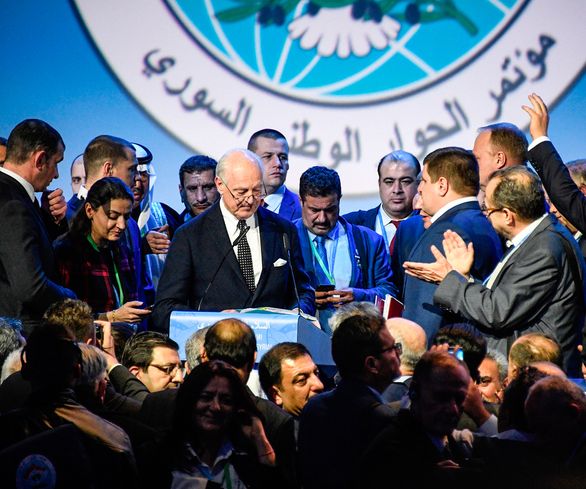 Russia's recent Syrian National Dialogue Congress elicited rather strong, mixed reactions. Admirers of Russian foreign policy hail the event as a triumph for Moscow, calling it another testament to the country’s ability to overcome notoriously difficult problems no one else can manage. But critics deem the Sochi conference a major setback, highlighting the limits of Russian influence in the Middle East.
Russia's recent Syrian National Dialogue Congress elicited rather strong, mixed reactions. Admirers of Russian foreign policy hail the event as a triumph for Moscow, calling it another testament to the country’s ability to overcome notoriously difficult problems no one else can manage. But critics deem the Sochi conference a major setback, highlighting the limits of Russian influence in the Middle East.
Both sides are wrong.
It wasn't a triumph; rather, it was a resolution of the specific issues identified. It wasn't a defeat, but a demonstration of the boundaries of attempts to end Syria's seven-year civil war.
Let's recall that Russian President Vladimir Putin voiced the idea for the congress in October 2017 in an address at the annual Valdai Discussion Club conference. At that time, however, it wasn't entirely clear what he meant by the “scheduled event in Sochi."
The information that surfaced in the media or came from Kremlin experts in the following months did little to clarify the case. Different dates and locations were announced, a list of participants was made public only to disappear sometime later and the name of the event changed. Some said Putin needed the congress ahead of the 2018 presidential elections. Others believed Moscow intended to announce the end of the conflict and wrap up the peace settlement. Many feared the Sochi negotiation process would detract from the Geneva format.
Undoubtedly, the Kremlin took care to organize media coverage of the congress, held Jan. 29-30 in Sochi. However, it wasn't described as an important element of the presidential campaign. Actually, even Kremlin spokesman Dmitry Peskov's statement shortly before the congress highlighted Russia’s moderate expectations about the event. Moreover, the Sochi venue was never a substitute for the Geneva peace process. On the contrary, the commitment to the UN-backed negotiations and UN Security Council Resolution 2254 — a timeline and structural guide for the Syrian peace process — became a major part of the congress’ official discourse. It appears the organizers tried to reflect the wishes of Syrian society and international players to reach an agreement.
Those who are serious about successful peace-building urgently need to make the Geneva process work. One example of this urgency can be seen in the de-escalation zones established in peace talks held in Astana, Kazakhstan. The zones emerged as relatively effective instruments for reducing violence on the ground at first. However, they have failed to achieve the stated objective of revitalizing the Geneva talks. Their limits are becoming clear, and they appear to be gradually losing their effectiveness, as evidenced by the fierce fighting in eastern Ghouta, Idlib and Afrin. Disagreements between the guarantor countries — Iran, Turkey and Russia — and some revenge-seeking players who want their pound of flesh will make it even harder for the cease-fire program to hold. At the same time, the nascent institutions of self-government, independent from Damascus, may ultimately transform the de-escalation zones into Kurdish-style quasi-states.
The Geneva program's ineffectiveness so far seems linked to how the warring parties perceive the situation.
The Syrian government, which has emerged as a strong player on the ground, doesn't really find it necessary to reach common ground with the opposition. Time is on Damascus’ side.
At the same time, the opposition is going to be even less disposed to engage in dialogue with the regime. Opposition leaders, who are incapable of winning the war, are at a crossroads. Some may agree on a limited and uneasy compromise, which Damascus still needs, to improve their international standing. For others, however, this is a forbidden path. Thus, they will have to adopt an increasingly rigid stance and wait for the second stage of the conflict to come after they have opted out of the game for some time. The failure to overhaul the country’s political system keeps the conflict going. Finally, others again derive far more benefits from the peace process than from its potential end. Under such circumstances, they are interested in endless foot-dragging over the issue.
Thus, Syrian society and international mediators — first and foremost Russia — are the only parties really pushing toward ending the conflict quickly.
By convening the congress, Moscow naturally sought to reassert its status as an indispensable mediator whose creativity and flexibility could help in most difficult situations. In the meantime, the participation of Turkey and Iran ensured the organizers' impartiality and allowed for strengthening the uneasy tripartite alliance.
Some 1,500 Syrians who arrived Jan. 29 in Sochi represented the civil society of the Syrian ethnic, religious and tribal groups; various political forces; and external and internal opposition, including the armed opposition.
Some groups, however, were not present. Representatives of the Kurdish nationalist Democratic Union Party failed to come because of Turkey’s implacable position. The regime wasn't represented; President Bashar al-Assad felt it would be inappropriate to attend, as he obviously considers his government to be legitimate.
A large part of the High Negotiations Committee refrained from attending the event. Two dozen of the group's 34 members voted against going, though several still went.
Shortly before the main session, some opposition representatives walked out; they reportedly had been promised that all regime flags and emblems would be removed from the venue ahead of time, but those symbols remained. After the delegation left, Turkey agreed to represent the group's interests.
The decisions not to participate seem ill-conceived, given that UN Special Envoy for Syria Staffan de Mistura attended. His presence was expected to give international legitimacy to the event. Opposition members who turned down the invitation opened themselves up to accusations that they were unwilling to contribute to the peace settlement.
The absence of some prominent Syrian forces deprived the assembly of its desire to project inclusivity but didn't render the event irrelevant. The congress was not conceived as a political negotiation; it was merely a get-together of different forces of civil society whose consolidated position could give fresh impetus to the peace process. In addition, some participants told Al-Monitor that many of those who intended to come had been threatened or otherwise pressured into abandoning the idea.
The organizers believed the agenda would focus on a number of items: drafting a new constitution, setting the stage for general elections under UN supervision, addressing humanitarian problems and developing a long-term comprehensive reconstruction program for Syria. However, the discussion revolved predominantly around a constitution.
Even before the start, it was known that the congress was due to adopt two documents. The first was a final communique compiled on the basis of the Naumkin document, a number of proposed basic principles of an inter-Syrian settlement named for Vitaly Naumkin, the head of the Institute of Oriental Studies at the Russian Academy of Sciences and an Al-Monitor contributor. The second item was an appeal to the world community regarding the urgent need to resolve the humanitarian crisis and move toward conflict settlement and Syria’s restoration. In addition, plans were made public to create special working groups and a constitutional commission whose work would help boost the Geneva process.
The blueprints of the documents, as well as the proposals regarding the commission, had been drafted in advance. However, the composition and the underlying principle for the constitutional commission aroused fierce controversies among the participants. As a result, the compromise reached by midnight included a list of 150 candidates — 100 from the government and 50 from the opposition — for the constitutional commission, while de Mistura was empowered to adjust the proposed list at his sole discretion in the interests of the settlement.
The final agreement can't be called a breakthrough, but it is the most notable result of the settlement efforts over the last year. The problem, however, is that even though the agreement was more comprehensive and had more signatures in its support than previous efforts, it's completely unclear how it would be able to make the negotiations in Geneva work, given the continued conflict among the parties' true interests.
Article published in Al Monitor: http://www.al-monitor.com/pulse/originals/2018/02/syria-settlement-process-next-sochi-russia.html
Photo credit: ALEXANDER NEMENOV/AFP/Getty Images
Russia and Israel: trust despite disagreements
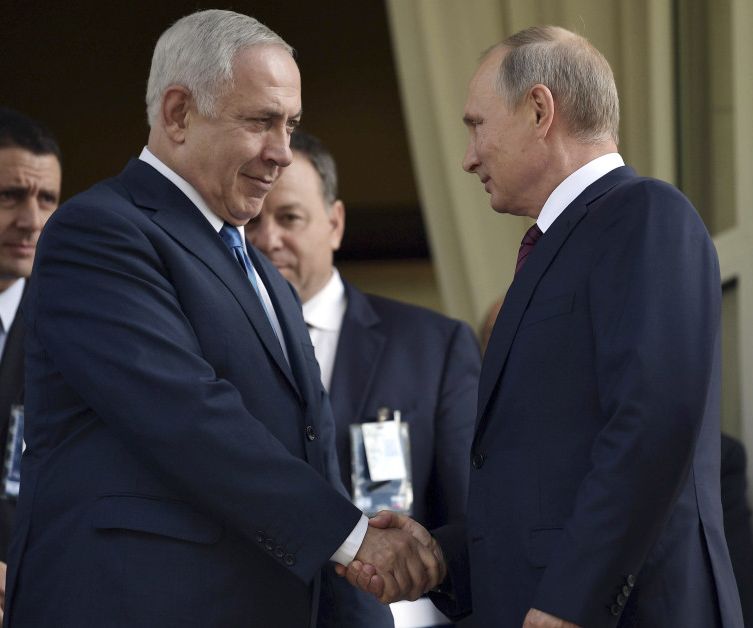 There is a high degree of trust in the Russian-Israeli relations, Valdai Club expert Irina Zvyagelskaya believes. “We have disagreements on Syria and the Palestinian-Israeli conflict. But we can maintain good relations despite these disagreements and understand each other’s concerns,” she said in an interview with valdaiclub.com.
There is a high degree of trust in the Russian-Israeli relations, Valdai Club expert Irina Zvyagelskaya believes. “We have disagreements on Syria and the Palestinian-Israeli conflict. But we can maintain good relations despite these disagreements and understand each other’s concerns,” she said in an interview with valdaiclub.com.
On January 29, 2018, Israeli Prime Minister Benjamin Netanyahu visited Moscow and met with Vladimir Putin. Netanyahu’s aide Zeev Elkin described the trip as “very important.” “As always, such visits are very effective and, as always, effectiveness is due to the fact that the content of the talks remains between the two leaders,” he said in an interview with the Israeli Russian-language Ninth Channel. In turn, Russian president’s aide Yuri Ushakov said that the two leaders discussed bilateral relations and regional problems, including the Syrian settlement.
“The situation in Syria was discussed in several aspects indeed,” Irina Zvyagelskaya, chief researcher at the Institute of Oriental Studies of the Russian Academy of Sciences, said in an interview with valdaiclub.com. “One aspect is our interaction, prevention of incidents. There is exchange of information between the military structures and this is of great importance for both sides. But the role of Iran and Hezbollah in Syria remains a much more painful issue for Israel. Israel maintains a very tough stance on this issue, fearing Iran’s strengthening near its borders.”
Because of the Hezbollah presence on the Lebanese-Israeli border, Israel has been saying for a long time that Iran is in his backyard, Zvyagelskaya stressed. Moreover, Israel and the Islamic movement have reached a level of mutual deterrence, which is unique in such an asymmetric conflict with military formations of Hezbollah not being a regular army.
According to Zvyagelskaya, “Israel’s top priority is its own security. It seeks to protect itself with methods it considers acceptable, and wants to have as few restrictions as possible in this regard,” she said.
“For our part, Russia cannot and should not become part of the complex system of regional relations,” Zvyagelskaya stressed. “We should resist attempts to make us part of the contradictions that exist there. Our position is that we are interested in stabilization in Syria and preservation of its statehood, that the country should not again turn into a hotbed of international terrorism.”
Another important aspect of the visit was, according to the expert, the fact that Netanyahu and Putin took part in events dedicated to the Holocaust Remembrance Day and the anniversary of the lifting of the Siege of Leningrad. “Israel is categorically against rewriting the results of the World War II, and pays tribute to the Red Army and heroism of Soviet people during the war,” she said. “On this, we find a common language, especially because Red Army veterans who fought during the war still live in Israel.”
According to Zvyagelskaya, there is a high degree of trust in the two states’ relations. “We have disagreements on Syria and the Palestinian-Israeli conflict. But we can maintain good relations despite these disagreements and understand each other’s concerns,” she concluded.
Article published in Valdai Club: http://valdaiclub.com/a/highlights/russia-and-israel-trust-disagreements/
Photo credit: SPUTNIK/ALEXEI NIKOLSKY/KREMLIN VIA REUTERS
Turkish foreign policy: From defensive to offensive
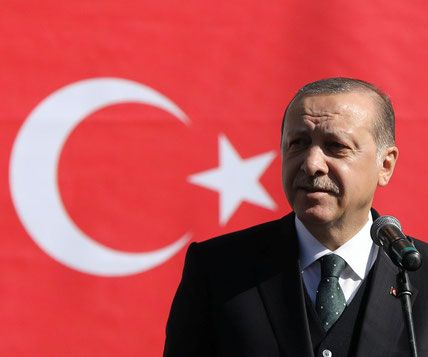 ey has sought to exploit the Qatar dispute with Saudi Arabia, the UAE, Bahrain and Egypt to grab a historic opportunity in the region. The dreams of a strong, regional Turkey necessitates great financial capabilities that cannot be achieved in light of the decline of the Turkish economy and its suffering from several crises, especially with its strained relations with the USA. Thus, Turkish President Erdogan found his relations with Qatar and Russia a decisive solution to Ankara’s financial problems.
ey has sought to exploit the Qatar dispute with Saudi Arabia, the UAE, Bahrain and Egypt to grab a historic opportunity in the region. The dreams of a strong, regional Turkey necessitates great financial capabilities that cannot be achieved in light of the decline of the Turkish economy and its suffering from several crises, especially with its strained relations with the USA. Thus, Turkish President Erdogan found his relations with Qatar and Russia a decisive solution to Ankara’s financial problems.
Turkey has maintained its footprint in the region and has expanded its influence in 2011, principally with the historical opportunity of the so-called "Arab Spring" in the Middle East, which was exploited by many countries including Turkey and Iran. As for Turkey, the Arab Spring has enabled political Islam Movements (Muslim Brotherhood) to jump to power in Egypt, Tunisia and Libya, and Ankara has become the major supporter of these movements. On the other hand, Iran has benefitted from the demonstrations in the Arab World to have a say in the region and to expand its influence as well.
Turkey has intervened vigorously in many regional crises in order to achieve its objectives and interests in the beginning with full support from the United States of America with which it has strategic relations until both Washington and Ankara had taken a new approach after Turkey had chosen to form its foreign policy that serve its own interests, deviating away from the course that was drawn for the country for many years.
Turkey's involvement in the Middle East has increased due to its effective use of soft power, such as the public debate between Erdogan and the then Israeli President Shimon Peres in Davos a few years ago, the flotilla incident, and Turkey's support for some Arab demonstrations, including those of Tunisia, Libya and Egypt as well as Syria.
The Cold War has largely defined Turkey's strategic perspective vis-à-vis the Middle East in general and the Arab world in particular. Ankara's strategic perspective to limit the influence of the Soviet Union in the Middle East has been shaped. The Arab Nationalist trend was also a means of supporting the influence of the Soviet Union in the region. This view was formed according to the perspective of the Western Camp to ensure the flow of oil from the Middle East region in a safe way to world markets. At that stage, Turkey has adopted a Western Camp stand.
Two political tremors
Since the end of the 1980s, changes in Turkish politics have been clear as there have been international and regional transformation as well which had driven Ankara to change its foreign policy. This has affected Turkey's view of the Middle East after the end of the bipolar world in the aftermath of the Cold War. There were two political tremors that have affected the Middle East since 1980-1990s: The collapse of the Soviet Union and the Gulf crisis.
Turkey was deeply affected by these tremors, and the Gulf War increased Turkey's interest in the Middle East. Everyone is aware of the importance of the region; mainly Iraq and Syria for Turkey. The Turkish government has started to consider how to develop a new vision that better serves its interests in the Middle East.
Turkey has abandoned its defense policy after 2011, years after the adoption of "zero problems" policy. The godfather of this policy is Ahmet Davutoglu, former Turkish prime minister. Turkey is no longer waiting for the problems of the region to come to its borders, but rather it is acting to defend itself as the Turkish foreign policy stipulates. Davutoglu said on October 19, 2016: "As of now we will not wait for problems, we will not wait for the terrorist organizations to attack us, but we will attack the areas where these organizations are hiding, and we will destroy their bases over their heads and we will uproots of all parties supporting them."
That is the policy adopted for their attack on Afrin and even beyond Afrin that would take them to Idlib and east to the Iraqi borders. Turkey saw the attack as the best way to defend itself and contribute to the formulation of new maps instead of being imposed on Ankara, especially after the attempted coup d'état in mid-July 2016. This has been the justification for the Turkish parliament to approve military operations outside Turkish borders, chiefly in Syria and Iraq for an additional year.
The Turkish moves in the context of the Turkish foreign defense policy, which Ankara has adopted recently to protect its national interests, are based on its belief that soft power is no longer effective to achieve its external ambitions, especially in light of the competition between regional and international powers. Therefore, Turkey has incepted to activate its military tools for several reasons as follows:
First, the desire to open up new markets for Turkish weapons. Turkish military industries rose in 2015 to reach $4.3 billion, of which $ 1.3 billion was exported. Second, the new military tool aims to strengthen its presence in the Arab region and Africa by controlling the international crossings to protect its economic interests and national security interests from any regional or international interventions or sanctions that would be imposed in the future on Turkey as a result of its foreign policies. Third, the other motive is the desire to participate in the international coalition against terrorism not only to counter the threat of terrorists near its borders, but to stop the expansion of Kurdish movements in Iraq and Syria for fear of independence.
Moreover, Turkey has the intention to besiege its enemies in their areas of influence and to cut off all logistic support for them that some regional and international powers are extending. Besides, Turkey is keeping abreast regional and international moves towards the region in order to limit its future negative repercussions on Turkish power, particularly in light of mounting Iranian and Russian dominance.
These Turkish accounts would put Ankara in the circle of friction with Russia and the US at a time the world is passing through a new type of Cold War and the Middle East is passing through its Cold War as well with many alliances and axes being formed. On the issue of the Kurds, Turkey has a spat with Washington regarding the future of the Kurds in Syria, Iraq, Iran and Turkey. While Ankara is moving to prevent the Kurds from strengthening their power and influence, especially in the areas near Turkish borders, Washington regards them as a key ally in its strategy to counter extremism and terrorism; this justifies why the Americans provide the Kurds with weapons and help train them.
Article published in Al Arabiya: https://english.alarabiya.net/en/views/news/middle-east/2018/02/03/Turkish-foreign-policy-From-defensive-to-offensive.html
Russian political stances beyond Western calculations
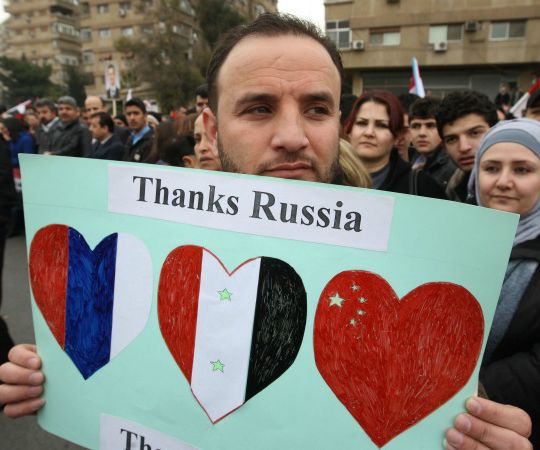 It is hard to believe that Western powers could ever have expected the invitation extended by Moscow to concerned parties to attend the Syrian National Dialogue Congress in the Russian Black Sea resort of Sochi.
It is hard to believe that Western powers could ever have expected the invitation extended by Moscow to concerned parties to attend the Syrian National Dialogue Congress in the Russian Black Sea resort of Sochi.
Sochi has become the hottest topic for Syrians and regional powers, along with the Astana conference and the UN-led Geneva gathering, both of which are of equal importance in the view of Russia.
However, suspicion has marred most Russian attempts to find a political solution to the Syrian conflict. That is, in great part, due to the negative influence of Western media reports on Russia’s role in Syria and the wider Middle East, often accusing Moscow of attempts to destabilize the region.
Even now, the US State Department describes Sochi as “a one-time solution,” and it is close to impossible to predict the outcome of the talks.
More than 1,600 delegates will attend the Sochi congress, each calculating the risks and benefits of this ongoing, multiplayer geopolitical chess game.
That game, of course, includes Turkey’s current military operation in Syria's Afrin — which Turkey has named “Olive Branch.”
Russia, US and other regional players are concerned now with the post-Daesh and Al-Nusra era, and with the threat of global extremism expanding from Syria and Iraq. The Afrin operation prompts all parties to offer a clearer definition of the division of areas of influence and control in Syria in order to implement a realistic plan that goes beyond strategic and idealistic ambitions to determine the future of Syria.
“Operation Olive Branch” could not have been launched without the approval of Russia, which controls Afrin’s airspace. The operation shows how deep the rift between Turkey and its ally, America, has become, as Turkey has effectively engaged in a battle with US-backed Kurdish militias.
Through “Operation Olive Branch,” Turkey is sending a message to the Americans and Russians that it will not allow any threat along its borders. The military action is complicating an already tense and unpredictable situation. Regiments of the Free Syrian Army, who receive military aid from the US but are supportive of Turkey, are now reportedly threatening to combat US forces in Afrin. The more awkward that situation becomes, the more it benefits the Damascus regime and its allies.
Russia — or Vladimir Putin’s Russia as it effectively is now as one man holds the strings of the country’s military and political institutions — is not, as some Western media depict it, “playing both sides.” It is, like all the players in Syria, trying to see how best to serve its national interest, fearing that if the Americans support the Kurds in Syria and play on existing ethnic tensions there, Washington will then use the Kurds to oppose Russian interests in Syria.
Moscow is seizing every opportunity to strengthen its position and role in the Middle East.
– Maria Dubovikova
Russia’s alliance with the Syrian state and the Syrian army is strategic; Moscow will do its utmost to deny any country any influence on this relationship.
In politics, there are no ethics, no honesty and no sincerity; just interests. That is true of all countries in Syria.
Paul Ryan, the speaker of the US House of Representatives, recently said that the US and Russia currently “perhaps” share “tactical symmetry for a convenient moment, but not a strategic alliance.”
What Ryan meant is that Washington and Russia have very different aims in Syria. America’s goal, simply, is to finish off Daesh and retain alliances with other militias in order to combat Iranian influence in Syria. He made that clear when he later added: “What matters most to us in Syria is defeating (Daesh) and preventing Iran from having a land bridge and Hezbollah a foothold.”
Tension between Ankara and Washington has escalated in the past few days: Turkey has threatened to extend “Operation Olive Branch” as far as Manbij, which is located north of Aleppo and lies between Afrin and the Kurdish autonomous region, home to a regiment of American soldiers advising the Syrian Democratic Front (SDF). US President Donald Trump’s call with Turkish President Recep Tayyip Erdogan did little to calm the situation.
Trump warned Erdogan of the “growing risk of conflict” between the two nations and reportedly promised to stop supporting the Kurds. Once given, the promise was almost immediately broken. Besides, it seems neither promise nor threat will dissuade Turkey from its course in Afrin.
This plays into Russia’s hands. Russia is seizing every opportunity to strengthen its position and role in the region. Russian tactics permit Moscow to stay above controversies in which Washington and even Turkey have become embroiled, enabling Russia to take the initiative in a number of activities in Syria.
The Afrin issue, then, could shape Syria’s future and the future of Turkish-American relations.
Article published in Arab News: http://www.arabnews.com/node/1234711











